Charting state’s course toward food security: Special agriculture panel focuses on bolstering food banks
| Published: 11-16-2023 5:25 PM |
NORTHAMPTON — While extremist Republicans in Congress are trying to gut programs that provide food to those in need, Massachusetts could become the first state to end hunger, U.S. Rep. Jim McGovern told a special state commission on agriculture Thursday.
McGovern praised farmers as well as the state Department of Agriculture Resources (MDAR), the Legislature and Gov. Maura Healey for their work to support nutrition programs, such as the universal free school meals program enacted this year.
Contrasting this with the dysfunction in Congress, he said the budget extension passed this week was “probably a good thing,” since congressional Republicans have set their sights on billions of dollars in cuts to the Supplemental Nutrition Assistance Program (SNAP), formerly known as food stamps.
“Please don’t give up on Congress, but understand we don’t wait for Congress,” he said. “Let’s be the first state to end hunger. We have a road map — let’s get it done.”
McGovern, a longtime advocate for farms and food security, was one of several speakers invited to address the fifth public hearing of the Special Commission on Agriculture in the Commonwealth in the 21st Century. The panel, co-chaired by Sen. Jo Comerford, D-Northampton, and Rep. Kate Hogan, D-Stow, is charged with producing a report and recommendations by the end of next year.
Thursday’s hearing, held virtually, focused on food security.
Kate Adams, public policy manager for the Greater Boston Food Bank, said the organization looks for ways to support Massachusetts farmers. She cited the Pioneer Valley Growers Association as a co-op model that the food bank would like to see more of.
Insufficient volume is one of the challenges to partnerships with local farms, she said. The Boston food bank is the largest hunger relief organization in New England, she said, serving 70% of the state’s food-insecure population.
Article continues after...
Yesterday's Most Read Articles
 More than 130 arrested at pro-Palestinian protest at UMass
More than 130 arrested at pro-Palestinian protest at UMass
 Public gets a look at progress on Northampton Resilience Hub
Public gets a look at progress on Northampton Resilience Hub
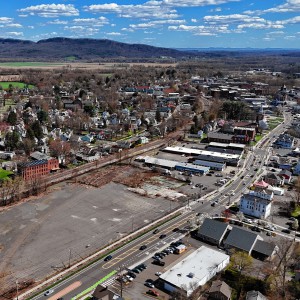 Northampton bans auto dealerships near downtown; zone change won’t affect Volvo operation on King Street
Northampton bans auto dealerships near downtown; zone change won’t affect Volvo operation on King Street
 UMass basketball: Bryant forward Daniel Rivera to be Minutemen’s first transfer of the offseason
UMass basketball: Bryant forward Daniel Rivera to be Minutemen’s first transfer of the offseason
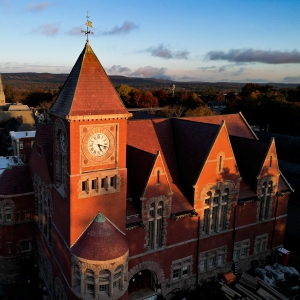 Town manager’s plan shorts Amherst Regional Schools’ budget
Town manager’s plan shorts Amherst Regional Schools’ budget
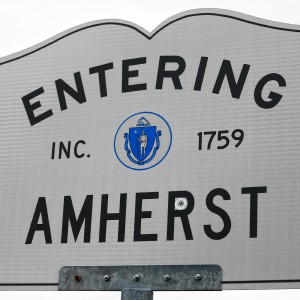 Police respond to alcohol-fueled incidents in Amherst
Police respond to alcohol-fueled incidents in Amherst
Andrew Morehouse, executive director of the Food Bank of Western Massachusetts, said the organization has seen a steady increase in demand for food assistance this year, with 107,000 individuals served in August, up from 82,000 in February, and edging toward the 2020 peak of 120,000.
Inflation is the underlying cause of the increase, he said, noting that macroeconomic forces often dictate these trends.
“In 2005 we had a goal of reducing food insecurity by 10% by 2010,” Morehouse said. “We failed because the recession hit in 2008.”
He also noted that inequity is an issue in agriculture, with people of color often shut out of farming opportunities.
The food bank is establishing an incubator on one of its farms to support emerging farmers, he said, and plans to convert over 50 acres to provide access to cropland.
Jay Harrison and Becca Miller of the Massachusetts Food System Collaborative gave the panel a rundown of their recent report, “New England feeding New England.” One of the organization’s goals is that regional producers will supply 30% of the food consumed in the state by 2030.
Breaking down the numbers, Harrison suggested that the state would need to add almost a million acres in underutilized or new cropland to meet that goal. But the reality is that Massachusetts is still losing farmland to development.
More pointedly, he said, dollar stores, often located in areas where there are no supermarkets, are the most prolific type of food retailer in New England and the nation, and they are not an outlet for regionally grown foods.
Miller said the Agricultural Preservation Restriction program is one way of protecting the state’s food base. The state’s agricultural sector has some strengths, including a healthy support system and a strong consumer base.
But, she added, the $670 million commercial seafood industry, a vital part of the economy, is under threat because of the rapidly warming Gulf of Maine.
Miller also said there’s a concern that the Healthy Incentives Program (HIP), which provides fresh fruits and vegetables to SNAP recipients, may run out of funding.
Morehouse said HIP is a “critical connector” between farm production and food insecurity, but he that the participation rate is very low.
“Purchasing power is key,” he said.
The commission’s next hearing is scheduled for January.
James Pentland can be reached at jpentland@gazettenet.com.

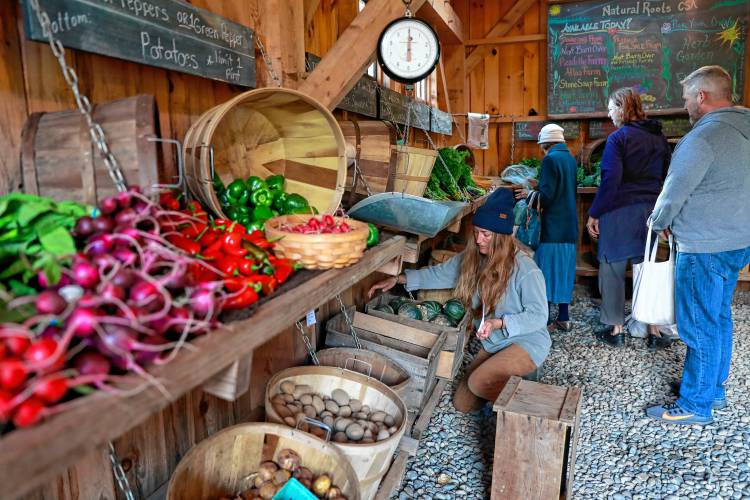
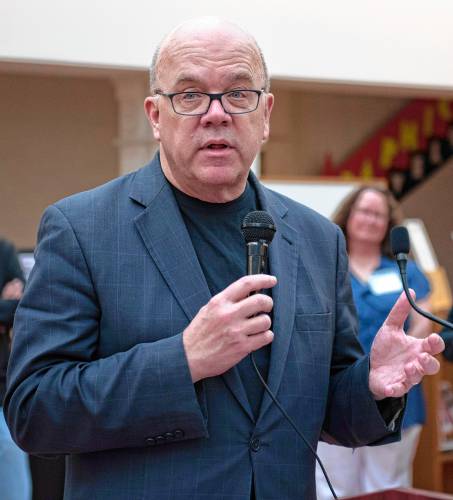
 State Senate budget funds free community college for all
State Senate budget funds free community college for all ‘We can just be who we are’: Thousands show support for LGBTQ community at Hampshire Pride
‘We can just be who we are’: Thousands show support for LGBTQ community at Hampshire Pride Doors open at Tilton Library’s temporary home at South Deerfield Congregational Church
Doors open at Tilton Library’s temporary home at South Deerfield Congregational Church Area property deed transfers, May 2
Area property deed transfers, May 2
